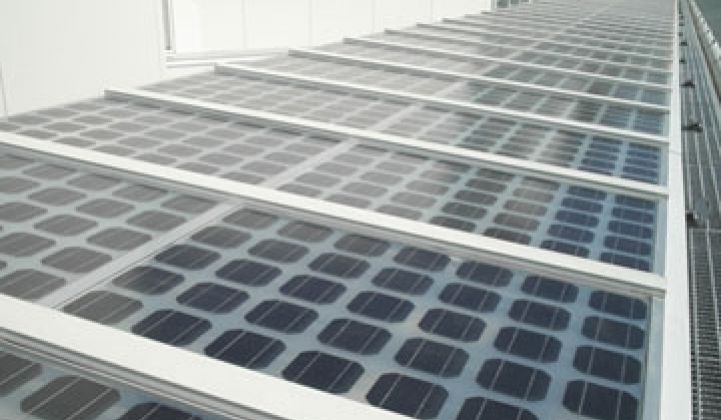SolarWorld has been advocating policies that would protect German companies against Chinese competitors. Those rallying cries could produce unintentional results, warned a Suntech Power official Monday.
SolarWorld's CEO, Frank Asbeck, has made headlines in recent months with his calls for regulations to fend off Chinese companies, whose ability to offer cheaper solar panels have caused no small amount of worries among European companies as well as American manufacturers such as First Solar (see Is Buying European a Good Idea? and First Solar Fears Competition From Silicon Panel Makers).
Asbeck employed a new tactic Monday when he called for lowering Germany's lucrative solar incentives, which have helped make the country the world's largest solar market. At the same time, he wants to institute environmental and quality standards that some analysts believe would make it difficult for Chinese companies to comply.
"What we want is fairness," Asbeck said at a press event at the 24th European Photovoltaic Solar Energy Conference in Hamburg (via Reuters).
Lowering the incentives, called feed-in tariffs, might end up boosting the sales of Chinese companies because project developers would be more likely to choose lower-cost equipment to offset the feed-in tariff declines.
"If they lower the feed-in tariff drastically, then the only companies that can supply panels at a lower rate are the Chinese, so be careful what you wish for," said Steve Chadima, vice president of external affairs at Suntech, which is the largest solar panel maker in China and one of the largest in the world.
The idea of lowering the feed-in tariffs has gathered in momentum in recent months as German politicians and public debate over whether the government is spending too much money subsidizing an industry, and whether those incentives benefit Chinese companies far more than Germany's own (see German Solar Incentives in Jeopardy?). The federal election scheduled for Sept. 27 is seen as the catalyst for stirring up the debate.
But Asbeck's support for such a move is the first by someone from the solar industry, noted Alexander Karnick, an analyst with Deutsche Bank, in a research note Monday. Asbeck is supporting a 10 percent to 15 percent drop for the incentives in 2010; the current policy calls for an 8 percent to 10 percent declines.
Karnick believes Asbeck is trying to achieve two goals here. The first is to preempt a discussion about setting a cap for the amount of new solar energy production that could qualify for the incentives.
"We also believe that this is an attempt to protect the German market against low-cost, price aggressive Chinese competition, which would be at risk for not meeting demanded social and environmental standards," he wrote. "This maybe a more promising attempt than a 'Buy Germany' legislation."
What those environmental standards are and whether Asbeck's idea would find enough support from lawmakers remain to be seen. But he isn't alone in promoting protectionist policies. The stimulus package approved by the U.S. government in February this year has a "Buy American" provision that would apply to public projects, something that Asbeck has used to justify his view about protecting European companies.
Chadima said such nationalistic sentiments are misguided because solar business is global, and many companies buy materials and factory tools from suppliers in Europe, the United States and other regions.
"I think cool heads will prevail eventually. People are just letting off steam," Chadima said. "We say the same thing to the Chinese government: we don't think there should be 'Made in China' provision for any incentives in China either."
SolarWorld, incidentally, opened a solar cell factory in Oregon last year. The move will better serve the growing U.S. market. The company also has a panel assembly plant in California.
Suntech, meanwhile, is planning to open a solar panel factory in the United States, a decision to enable the company to meet any 'Buy American' policy or sentiment. The company has narrowed the site choices to somewhere around Phoenix and Texas, Chadima said.
Image via Suntech.



